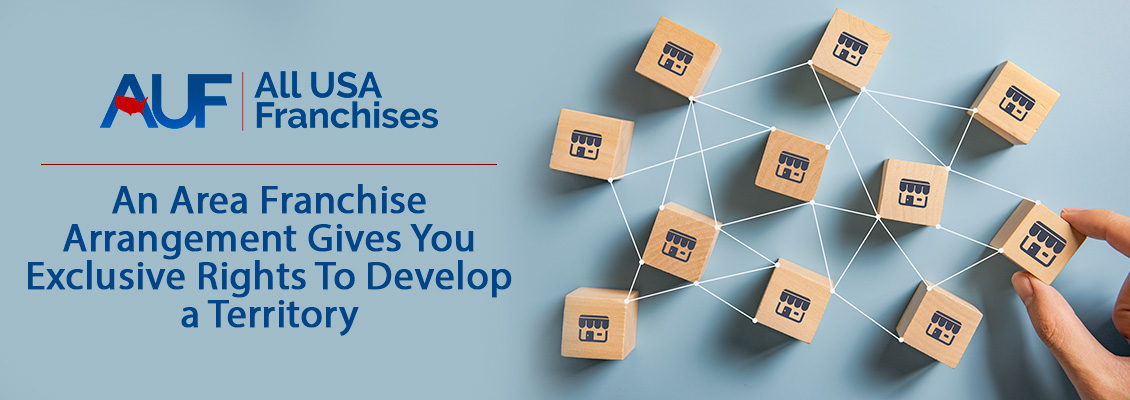There are four basic franchise arrangements. While they are relatively easy to define, understanding each of them and how they work requires more examination. If you want to get into the world of franchising, you likely have questions about these arrangements and how they might apply to you.
Franchising can be a great way to go if you want to build wealth and be able to live the lifestyle you've dreamed of. Your approach depends on your goals, the resources you have to start with, and the time you want to invest.

We recently published a blog,
"Are Semi-Absentee Franchises Worth It?," and that might be a great read along with this one because it talks about levels of franchise ownership and the time and responsibilities associated with them.
Like the different levels of franchise ownership, each of the four franchise arrangements comes with unique responsibilities, resource requirements, and various degrees of commitment.
What are the four types of franchise arrangements, and how do they fit in with your lifestyle and goals? Let's dive in.
What Are the Four Types of Franchise Agreements?
Let's start by putting it in a nutshell.
- Single-Unit Franchise – This arrangement grants the franchisee the right to operate a single unit and is ideal for first-timers. You'll have one franchise to devote your time and resources to.
- Multi-Unit Franchise – This is like a single unit, except that you will have several franchises to work with. Some people start with one franchise and transition to multiple units. If you have a little more experience, this may be a path you go down in the franchising world.
- Area Development – The franchisee has the right to open multiple units, but there's more to it than that. The most significant difference here is that the franchisor gives you exclusive rights to a particular region, preventing other franchisees from opening up locations in your area.
- Master Franchise – This arrangement requires you to have more capital, time commitment, and extensive experience running a business. In addition to having the rights granted in the area-development franchise agreement, you're given the right to act as a franchisor, with the ability to sell franchise locations and make decisions on behalf of the franchisor.
Getting Started With a Franchise Agreement
How do you determine which of these four franchise agreements is right for you?
If you're just getting started, some of the choices might be obvious. A first-time franchise owner is not likely to enter into a master franchise agreement. This is an arrangement the franchisor will only grant to someone with proven franchise ownership experience and strong business acumen skills.
If you're new to franchising, a single-unit franchise agreement is an ideal place to start. It allows you to buy a franchise for less capital (the cost of a single unit), and it lets you choose how involved you want to be with the day-to-day operations of the business.
As a single-unit franchise owner, you can continue to operate your franchise happily, or you can look ahead to expanding into multiple units as you gain experience. Owning one franchise and making it successful is challenging. However, it doesn't require the knowledge and resources associated with the more complex agreements we've mentioned.

A multi-unit franchise arrangement is better suited to someone who has more start-up capital at their disposal, experience operating a franchise, and the skill set of a business entrepreneur.
Multi-unit franchises are usually owned by someone investing or trying to build a franchise empire. Rarely is the owner of multiple franchises involved in day-to-day responsibilities. Their time is spent investing in other opportunities or simply enjoying the passive income of their franchise units and maybe checking in every now and then.
Area development is similar to the multi-unit arrangement, but some differences make it more of a challenge. Money, experience, and commitment are determining factors as to whether or not this arrangement is suitable for you.
A master franchise arrangement entails all of the above and the ability to demonstrate to a franchisor that you can act on their behalf. Besides having the financial means, you will need to be fully committed to the brand and be prepared to take on the role of the franchisor.
Let's take a close look at each of these arrangements to help you decide which is the right choice for you and your goals.
Single-Unit Franchise Arrangement
A single-unit franchise means you own one franchise unit and are operating the business under the terms of the franchise agreement.
The cost of a single-unit franchise varies. It ranges from thousands of dollars to millions, depending on the company's size and the brand's strength.
You are responsible for the start-up and ongoing costs of operating the franchise. Most people get a loan to start, but the continual expenses of running the franchise come from the revenue generated by the business.

Managing a single-unit franchise is flexible and depends on your preferences in how involved you want to be.
Some franchisees prefer the hands-on approach of being at the franchise every day. Others prefer to check in occasionally while they spend most of their time doing other things. Some investors buy the franchise for passive income and don't get involved beyond financing it.
Single-unit franchisee obligations include:
- Paying ongoing franchise fees (advertising, royalties, etc.)
- Adhering to the franchise agreement
- Maintaining brand integrity
- Communicating with the franchisor
- Hiring, paying, and training employees (if required)
- Quality control and customer service
If you can meet these obligations, a single-until franchise agreement could be for you.
Multi-Unit Franchise Arrangement
The responsibilities of a multi-franchise arrangement are the same as those of a single unit. You just own multiple franchises instead of one.
Since you can't be everywhere at once, you'll need to rely on your managers and employees to oversee much of the day-to-day operations of each unit.

Many multi-unit owners' goals are to slowly grow their franchise ownership portfolio. Experienced entrepreneurs, for example, are well-suited for this arrangement. They can allow their units to be managed by their staff while they divide their time between expanding a current franchise and exploring other business opportunities.
Area Franchise Arrangement
An area development franchise arrangement is more complex than single- or multi-unit franchise ownership.
The franchisee (aka the multi-unit developer) owns multiple franchises, but rather than having the units in different territories, all of them are designated to a specified area. The intent is to expand the franchise brand to territories it isn't currently in.
In addition to the franchise agreement, you will sign a multi-unit development agreement with the franchisor.
A multi-unit agreement requires you to open a set number of new franchises within a given market within a specified time.

The terms of these agreements vary. But for example, you agree to open five locations in five years. You pay the initial franchise fee upfront, with deposits and fees added for each additional unit you decide to open per the terms of the agreement.
This requires a huge start-up cost, which is one of the reasons why area franchise agreements aren't for everybody. The costs can be prohibitive and rule out many candidates immediately.
Advantages of Area Development Agreement
If you are an entrepreneur with enough capital, experience, and have time to take on an area agreement, there are some significant advantages.
The most significant one is that you lock down a region or market, and you are the exclusive franchisee for that territory, which is a pro because that means avoiding competition from other franchisees.
Additionally, many franchisors pay their franchisees an area development fee.
The reward varies and is based on the task of finding and selecting locations, which falls on the franchisee without the franchisor's help or with very little oversight. So the more work you do on this front for them, the higher your financial payout is in return for scouting territories or markets.
Development-related tasks could range from choosing the property, working with construction companies, figuring out the logistics, gathering permits, leveraging your project management and communication skills working with others, and so much more.
That's why franchisors want to pay you to do all the heavy lifting for them when it comes to developing a territory for its franchises.

Multi-unit developers often pay a lower start-up cost per franchise than someone buying a single unit. Once the area developer has fulfilled their contractual agreement, the franchisor allows additional units to be established at a lower price.
This goes for the royalty fees as well. You can negotiate lower royalty fees for yourself with the franchisor. This makes sense to the franchisor because the cost of supporting a multi-unit franchise is lower per unit than a single unit.
Multi-unit agreements benefit the franchisor by letting them secure key markets, which allows them to plan marketing support strategies, negotiate with suppliers, and secure that region without looking for new franchisees.
Franchisors don't enter into area agreements with anybody who says they want to do it. There is an inherent risk for them. Once the agreement is made, the territory becomes unavailable for further consideration. The franchisor makes every effort to ensure they choose a candidate who will follow through.
If you choose this route, you should be ready to commit to meeting the timelines described in the contract and run each of the franchise units accordingly. Not following through on these obligations could cost you your investment and even put you at risk for legal action from the franchisor.
Master Franchise Arrangement
A master franchise arrangement is for the serious entrepreneur/investor. You enter the franchise world on an entirely different level than with the other agreements we've mentioned.
As with an area agreement franchise, you must sign an additional agreement: the master franchise agreement. You're granted the right to act as the franchisor with the ability to open new franchise units.
The master franchise arrangement is truly an executive business model. With this agreement, you share the profits and benefits on a larger scale.
Area development and master franchise agreements are similar to multi-unit franchising minus the perks, responsibilities, etc. The most significant difference is that just because you own multiple units, doesn't mean you have the authority to operate within a designated region or market.
That comes with area development granted by the franchisor's permission.
An area development agreement, on the other hand, doesn't grant you the right to sell, lease, or transfer a franchise. That comes with the master agreement.

Master franchising is busy work. You'll be responsible for recruiting franchisees, training them, and supporting your existing franchises. In addition, you may be required to sell a set number of franchise units as part of your agreement. Marketing and all of the costs entailed also fall on you, as well as the costs associated with developing the franchise.
One example of a master franchise arrangement might be the intent to launch the brand in another country. In this situation, the franchisor relies on you to handle all the logistics and costs of establishing and building the brand internationally.
Studies show that about 20% of US-based franchises use master franchising expansion tactics when they want to grow their presence in other countries.
This approach is cost-effective for the franchisor because you, as a master franchisee, handle everything associated with construction, property acquisition, opening new units, coordinating supply logistics, dealing with trade partners, etc.
The master arrangement requires the most significant commitment of time and money. It also requires you to have enough experience with multiple facets of business that allow you to negotiate with a multitude of people (sometimes from different cultural backgrounds).
Being able to "get things done" is crucial.
The reward is a percentage of initial franchise fees and royalties. You could also share equities for any real estate investments the franchisor has.
Legalities of Franchise Arrangements
Purchasing a franchise is a life-changing event. Entering into one of the more complex franchise arrangements is a huge commitment. You don't do it because you want to fail. However, if circumstances make it impossible to meet the obligations of a franchise agreement, what are the legal ramifications?
With that said, even though All USA Franchises is well-versed in everything franchising, we still have to add a disclaimer that our blogs are not to be taken as legal advice. You should still get recommendations from
expert franchise lawyer, or
advisor specializing in franchising.
Now that we got that out of the way, you can get out of a single-unit agreement relatively fast. You may be able to turn the franchise over to the franchisor; however, you might have to pay any remaining debts.
In some cases, and depending upon how long you have owned the franchise, you might be able to find a buyer for it. If you are at the end of your agreement term, you could sell it back to the franchisor and walk away.
The same idea applies to those who own multiple units. Always approach the franchisor if you find yourself in a situation where you need to sell your franchise. The rules regarding the sale or transfer of a franchise vary.

Some franchisors forbid third-party sales altogether. Others have first-refusal rights, meaning they have the option to prevent you from selling to a potential buyer by matching the buyer's price and repurchasing the franchise. This effectively prevents a third-party sale.
Getting out of area development and master franchise arrangements can be tricky. The franchisor has a lot more riding on the deal. A lot of time and effort goes into setting up an agreement of this magnitude.
Franchisors vet their prospective franchisees before agreeing to sign a master franchise or an area development franchise agreement. You're not just opening a franchise. You compete for an entire region or the right to share the same benefits as the franchisor.
Under the terms of the area and master development franchise agreements, you could be held liable for lost revenue if you back out of a deal. A franchisor could even retain all or some of your initial investment.
For specific legal obligations, always have a franchise attorney review the terms of the agreement with you. It's essential to understand what you're getting into and what your legal options are from the outset, especially if the arrangement falls through.
Start your franchise search today! Search by industry or by investment.
If you found this article helpful, let us know in the comments below. Likewise, feel free to share it using the share options below. Want us to cover another topic of your interest about franchising? If so, then like us and follow us on social media, and post to any of our social media profiles the topic you'd like us to discuss: Facebook All USA Franchises, Twitter @AllUSAFranchise, and Instagram @allusafranchises







